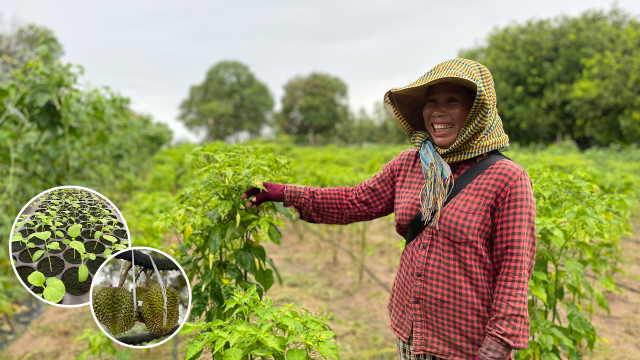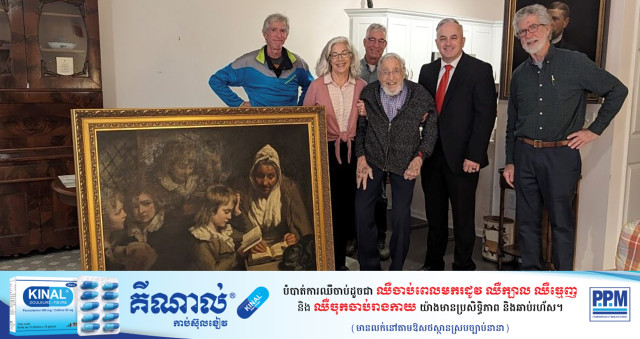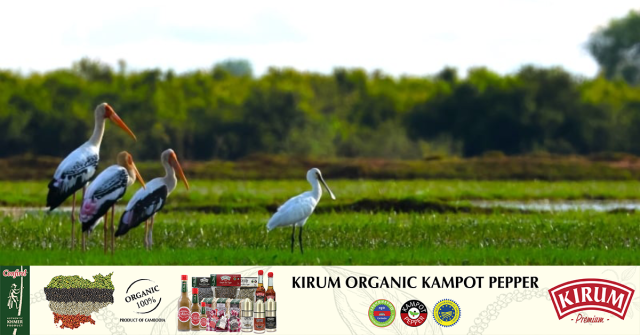Around 250 Families in Koh Kong Province Happy to Have Turned Away from Logging and Hunting for Farming

- By Chhum Chantha
- July 16, 2023 11:25 AM
PHNOM PENH — The Sovanna Baitong Community has helped its 250-member families make the transition from hunting and logging to farming by providing them with land and training. And those involved say they are happy with the results.
Before the Sovanna Baitong community was founded in the mid-2000s, the families made a living as loggers, nomads, farmers, and hunters. Since the majority of them lived in Koh Kong province's natural resource conservation areas along rivers, streams, and in valleys, they did not have fixed homes.
Ath Nuch, community chief of the Sovanna Baitong Community, said that people who joined this community were provided with opportunities to become farmers as long as that they no longer did logging or hunt.
“Since they came to live in the community, they have stopped hunting, stopped cutting down trees to make nomadic plantations, and stopped trapping: What the law prohibits, they have all stopped and turned to permanent farming," Nuch said.
For the past 18 years or so, Nuch has seen the community improve its living standards, grasp the meaning and importance of conservation, and stop deforestation and hunting, he said.
“Their lives are very different;” he said. “In the past, they earned to live from day to day, and the land on which they earned money was not theirs." Today in Sovanna Baitong Community, he said, “they have their own land and can send their children to school.”
Ath Nuch himself was once involved in logging and hunting but, after getting information and training from the NGO Wildlife Alliance that developed several projects in the area to help people earn incomes while protecting the environment, he gave up his old life and jobs, and worked on natural resources, eventually becoming the community's leader.
“In the past, the people of Chi Phat were like the indigenous people,” Nuch said. “We did nomadic farming and found food in the forest. This, until we grasped the impact of deforestation, especially the loss of oxygen. Then, we changed.”
Another former logger, Han Kun Nan, said her family has been living in Sovanna Baitong for more than 10 years and is relying on agriculture. She said moving to this new land has made life better, thanks to the support and training of the Wildlife Alliance—the NGO developed several projects in the area to help people earn incomes while protecting the environment.
Kun Nan earns 20,000 riels per day (about $5)) from selling vegetables. She said this business is easier and more lucrative than logging. She regrets to have cut trees in the past but at the time, she did not understand the importance of forests, she said.
“I used to live in Andoung Tuek commune where I used to be a logger,” Kun Nan said. "But I no longer do that because I am a farmer now and understand some of the impacts of deforestation: If we save the forest, it will benefit our children in the future.”
The Sovann Baitong Community covers more than 3,000 hectares using more than 900 hectares for housing, growing vegetables and fruits such as durian and rambutan.
The Wildlife Alliance provides 1.5 hectares of legal land per family, conducts training in cultivation techniques, animal raising and marketing. The NGO also provides seeds, fertilizers, agricultural equipment and sets up irrigation systems for the families at no cost in the Sovann Baitong community.
Originally written in Khmer for ThmeyThmey, the story was translated by Te Chhaysinh for Cambodianess.















